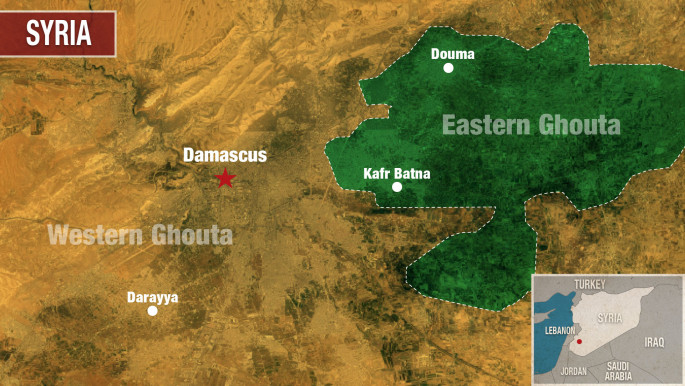Food arrives in Syria's battered Eastern Ghouta for hunger-stricken residents
Nearly 950 civilians have been killed since Russia-backed government forces launched a blistering assault on the last opposition bastion near Damascus on February 18.
Eastern Ghouta's 400,000 inhabitants have lived under government siege since 2013 and the enclave is home to a myriad of armed groups. More than half of the area has been retaken by regime forces over the past three weeks.
Civilians continued to bear the brunt of the violence on Friday with at least six killed in airstrikes on the area of Jisreen, the Syrian Observatory for Human Rights war monitor said.
Thirteen trucks loaded with 2,400 food parcels, meanwhile, crossed into Eastern Ghouta, the International Committee of the Red Cross said, entering what UN chief Antonio Guterres has called "hell on earth".
But "shelling" near the enclave's main town of Douma threatened "to put at risk" the joint ICRC, Syrian Arab Red Crescent and United Nations convoy, said the UN humanitarian coordinator in Syria, Ali al-Zaatari.
 |
|
The aid was delivered as helicopters hovered overhead and warplanes targeted areas outside Douma, a correspondent said.
The World Health Organisation said it has verified 67 hits on medical facilities in Syria through January and February, nearly half of them in Eastern Ghouta.
The facilities hit included 20 hospitals, 16 health facilities, two ambulance stations and one medical supply warehouse.
Doctors and nurses in the enclave have run out of several life-saving items, according to Doctors Without Borders (MSF), which reported a "terrible medical catastrophe."
"Medical material is extremely limited, medical infrastructure has been hit and medical staff are exhausted," it said, adding that hundreds of people have been wounded and need urgent assistance.
In the face of the regime's Russian-backed onslaught, Ghouta's main rebel groups had so far rejected Moscow-brokered offers to evacuate civilians or any of their own fighters.
But on February 27, they said in a letter to the United Nations they would be willing to expel fighters from the enclave as soon as a UN ceasefire took effect.
That offer came on the same day as a daily humanitarian "pause" called by Moscow began, a measure which fell short of a 30-day ceasefire called by the UN Security Council late last month.
In the town of Hammuriyeh, dozens of people took part in a protest calling for an end to the bloodshed, the Britain-based Observatory said.
"Enough destruction and death! We want to save our children and all those who have not died," said Abu Riyadh, a 47-year-old man in the town.
Syria's war, which enters its eight year next week, has killed more that 340,000 people since it erupted in 2011 with the brutal repression of anti-government protests.
UN High Commissioner for Refugees Filippo Grandi on Friday called the conflict a "colossal human tragedy".


